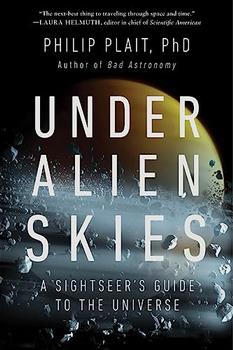Summary | Excerpt | Reviews | Beyond the Book | Readalikes | Genres & Themes | Author Bio

A Sightseer's Guide to the Universe
by Philip PlaitONE SMALL STEP
THE MOON
It's midnight, local time—not that that's useful; everyone goes by Coordinated Universal Time anyway, for convenience—and you're outside, lying down on a specially built chair. It's more of a chaise longue, to accommodate the bulky suit and support you in the correct position: basically, looking straight up. The other tourists in your group surround you in their own chairs, but there were over a dozen others already here when you arrived. Their spacesuits identified them as members of the south polar mining teams; apparently, all the space agencies and companies gave nonessential personnel special dispensation for this event. After all, no one would want to be working the ice mines now of all times.
This particular wide pad outside the big group airlock of Alpha was specially designed as an exterior observation deck for just this purpose. The chairs are adjustable but permanently mounted into fixtures embedded in the pad. They're made of some sort of material that's resistant to heat fluctuations and the harsh ultraviolet sunlight. The deck itself is made of regolith—pulverized rocks and dust from the surface, packed and treated for solidity.
You're not exactly comfortable but it's not too bad. The guides adjusted everyone's seat beforehand and made sure everyone was as cozy as possible under the circumstances. The outside lights were switched off a moment ago, but you can see just fine: A full Earth hangs nearly directly above you, casting more than enough light to see by. Certainly more than the full Moon does from Earth.
You look up at it. The texture of Earth's surface—the clouds, land, ocean—makes it hard at first to see what you came to see. But then you notice it: a small, fuzzy black circle, small compared to the disk of the Earth, slowly crawling across the face of humanity's home world. Speed is relative, of course. That shadow is moving at well over 1,000 miles per hour, faster than the speed of sound. But from a quarter million miles away, even that terrific speed is diminished.
The commlink fills with gasps and delighted shouts of "There it is!" You smile, but mute the link. You'd rather experience this for yourself. If there's an emergency, the guides can override the mute anyway.
Scooching around in the suit a bit to settle in, you reminisce about the time your parents took you to Wyoming to watch a solar eclipse. The shadow swept across the United States, and everyone at the time called it the Great American Eclipse. You were just a kid. You remember the light changing, the air growing cold, the singing birds stopping while crickets started chirping, thinking the approaching darkness was that of night and not the Moon's shadow sweeping across the landscape. When totality hit and the Moon blocked the Sun, the glory of the Sun's corona—its ethereal atmosphere, surrounding it like a luminous mist—took your breath away. It was eerie and beautiful, perhaps the most beautiful thing you had ever seen—until now.
This time, the silence is absolute. No wind, no birds, no insects. Just you, inside the suit, watching the shadow of the Moon slide across the Earth.
You block the Earth with your hand, and the glare from it vanishes. The sky around it is black, utterly black, but dotted with a few stars. Given a few minutes to let your eyes adapt, you would see thousands of them—but you've done that before, many times, when outside. Lowering your hand, Earth once again captivates your view.
Minutes later, you can tell the shadow isn't passing across the diameter of the planet, instead cutting a shallow chord across it. That's too bad, but it's still awe-inspiring—and it still counts.
And then it's over. You have to wait for the guides to help you up, because that sort of movement is a bit awkward in the low gravity. The miners, though, get right out and start heading for the airlock. Long experience makes it a lot easier for them to move around, you suppose.
Excerpted from Under Alien Skies: A Sightseer's Guide to the Universe by Phillip Plait. Copyright © 2023 by Phillip Plait. Used with permission of the publisher, W. W. Norton & Company, Inc. All rights reserved.
Talent hits a target no one else can hit; Genius hits a target no one else can see.
Click Here to find out who said this, as well as discovering other famous literary quotes!
Your guide toexceptional books
BookBrowse seeks out and recommends the best in contemporary fiction and nonfiction—books that not only engage and entertain but also deepen our understanding of ourselves and the world around us.